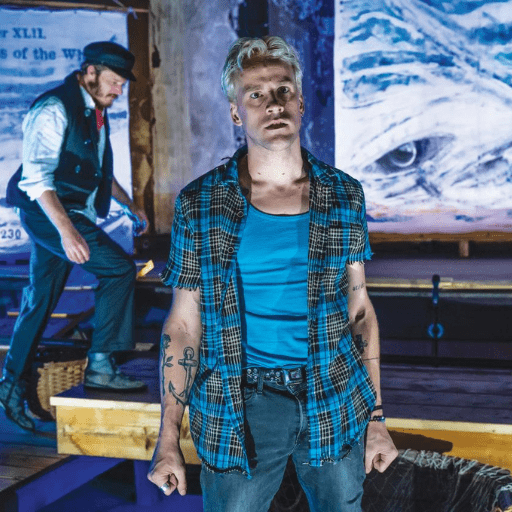A Playwright’s Reckoning with the Destructive Roots of Addiction
How do you confront a disease as sneaky and destructive as addiction? How do you kill a whale as fierce and murderous as Moby Dick?
Those are the words I used to describe the beginnings of my own personal and artistic journey after the devastating loss of my older brother, a commercial fisherman, to opiate addiction. As a playwright, I wrote a series of plays about the experience and, like Ahab, that famous captain of a whale ship in ancient New Bedford who lost his leg to the Great White Whale. I assembled the most capable, courageous crew possible, grabbed a good, sharp harpoon and set sail to hunt the evil animal down.
Like Ahab, I sought revenge for a traumatic loss: Ahab, for the loss of his leg; me, for the loss of my beloved brother. But I soon realized that you can’t get even with a drug, any more than you can get even with a whale, and I had to delve deeply into my own emotions. I had to come to grips with my anger and pain, not only by my brother’s death, but by the chaos and destruction left in his wake. I had to deal with The Ahab Inside Me.
To deal with these emotions, I wrote a play about addiction called “UltraLight” that dealt directly with opiate addiction in the fishing community of New England. The play premiered in New York City before touring Maine in 2003, and it connected deeply to people and communities struggling with addiction. Over the next 20 years, I wrote other plays about addiction, including a trilogy named “The Honor and Glory of Whaling.”
Writing plays about addiction and the chaos swirling around it has become a personal journey and artistic quest, and one that I now realize may end up with as many chapters as there are contained in the pages of Moby Dick.
It’s not a stretch to say that I’m obsessed. But my obsession no longer stems from anger. It stems from a need to educate and to dispel the myth that addiction is a choice rather than a disease and a “moral failing.” To blame a person struggling with substance use disorder for their disease makes no more sense than blaming an innocent whale for defending itself after being attacked.
There are many ways to attack addiction, but for me, it’s through art and theater. As an artist, a “creative” approach is the only approach that I know how to take. It is the approach that I took when I first learned of my brother’s heroin addiction and I sought the refuge of the theater to tell my story — the story of an affected family member. It’s a story that often gets ignored or consumed in the chaos of a family’s struggle to grapple with a loved one’s destructive addiction. And it’s an approach that I’ve been taking ever since.
It’s an approach that has led me to become an activist as well as an artist. It inspired me to create “Chasing the New White Whale-Harpooning Addiction,” an epic ongoing performance art and advocacy model and outreach tool that directly addresses the devastation being caused by the ongoing opiate epidemic in working and commercial fishing communities in Maine, New England and beyond.
It’s an approach that has led me to involve people in the community with lived experience dealing with substance use disorder directly in my productions as performers. Perhaps most significantly, it has led me to create an open forum of discussion — on stage, in the heart of the community — around our performances and the difficult issue of opiate addiction to help propel constructive social change.
Through my experience, I have become convinced that a creative approach is perhaps the most effective way to deal with the issue of addiction. It is the only way that truly seeks to speak to the spirit, imagination and holistic well-being of a community and its individuals.
But if there is one thing that I have also learned on my decades-long journey, it is that stigma presents the greatest barrier to healthy recovery within our communities. It is the force that leads to discrimination and shame and prevents people suffering from substance use disorder from seeking help. Internalized stigma leads to destructive behavior and self-harm and, like the Ahab inside of us, it leads to a violence turned inward that destroys hope.
Capt. Ahab was “addicted” to the thought of seeking revenge on an innocent whale and, as a result of his actions, a whole ship full of men — a community — lost their lives. That doesn’t have to be our fate. By coming together through the shared experience of live performance we can start to overcome stigma and begin to build healthier, more compassionate and understanding relationships within our communities and with ourselves.
My latest theatrical production is “The Ahab Inside Me-Redux,” an epic, uplifting tale of fishing, obsession, addiction and recovery that calls for a reevaluation of Ahab’s vengeful attitude toward the white whale and our own destructive relationship to nature, the environment and ourselves. It will premiere at The Colonial Theater in Augusta in July, and I hope you’ll join me and my courageous crew for a show!



